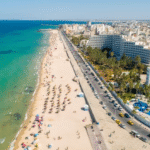Step-by-Step (2025 Update)
Are you dreaming of retiring in a country with warm weather, affordable living, and rich cultural heritage? Tunisia might be the perfect destination for you! This North African gem offers a retirement visa that allows foreigners to enjoy a relaxed lifestyle by the Mediterranean Sea.
In this comprehensive guide, we’ll walk you through everything you need to know about Tunisia’s retirement visa, including eligibility, application steps, costs, and benefits.
Table of Contents
- Why Retire in Tunisia?
- Types of Retirement Visas in Tunisia
- Eligibility Requirements
- Step-by-Step Application Process
- Required Documents
- Costs & Fees
- Renewal & Permanent Residency
- Benefits of Retiring in Tunisia
- Challenges & Considerations
- FAQs About Tunisia’s Retirement Visa
1. Why Retire in Tunisia?
Tunisia is an increasingly popular retirement destination for expats due to:
✅ Affordable Cost of Living – Housing, healthcare, and daily expenses are significantly cheaper than in Europe or North America.
✅ Warm Climate – Enjoy mild winters and hot summers, perfect for beach lovers.
✅ Rich Culture & History – Explore ancient Roman ruins, vibrant markets (souks), and UNESCO World Heritage Sites.
✅ Excellent Healthcare – Tunisia has well-equipped private hospitals at a fraction of Western costs.
✅ Strategic Location – Easy access to Europe (just a short flight away).
(Caption: Enjoy Tunisia’s stunning Mediterranean coastline as a retiree.)
2. Types of Retirement Visas in Tunisia
Tunisia offers different visa options for retirees:
A. Short-Stay Visa (Up to 90 Days)
- Suitable for those who want to explore Tunisia before committing to long-term residency.
- Can be extended for an additional 90 days.
B. Long-Stay Retirement Visa (1 Year, Renewable)
- The most common option for retirees.
- Requires proof of stable income or pension.
C. Permanent Residency (After 5 Years)
- After living in Tunisia for five years, retirees can apply for permanent residency.
3. Eligibility Requirements
To qualify for Tunisia’s retirement visa, you must meet the following criteria:
✔ Age Requirement: Typically, applicants must be 55+ years old, but exceptions exist.
✔ Financial Stability: Proof of a minimum monthly income (around $1,500–$2,000 from a pension or savings).
✔ Health Insurance: Valid medical coverage for Tunisia.
✔ Clean Criminal Record: A police clearance certificate from your home country.
✔ Housing Proof: A rental agreement or property ownership in Tunisia.
(Note: Requirements may vary slightly based on your nationality.)
4. Step-by-Step Application Process
Step 1: Apply for a Long-Stay Visa at a Tunisian Embassy
- Contact the nearest Tunisian consulate in your home country.
- Submit the required documents (listed below).
Step 2: Enter Tunisia & Apply for a Residence Permit
- Once approved, enter Tunisia and visit the Office of Foreigners (Bureau des Étrangers) within 30 days.
- Apply for a Carte de Séjour (residence permit).
Step 3: Medical Check-Up (If Required)
- Some applicants must undergo a health examination at a Tunisian hospital.
Step 4: Final Approval & Visa Issuance
- If approved, you’ll receive a one-year renewable residence permit.
5. Required Documents
You’ll need the following:
📄 Passport (valid for at least 6 months)
📄 Visa application form (filled and signed)
📄 Proof of income (pension statements, bank statements)
📄 Health insurance (covering Tunisia)
📄 Criminal background check
📄 Housing proof (rental contract or property deed)
📄 Passport-sized photos (recent, white background)
📄 Marriage certificate (if applying with a spouse)
(Some documents may require notarization or an apostille.)
6. Costs & Fees
Here’s a breakdown of estimated costs:
💰 Visa application fee: $50–$150 (varies by nationality)
💰 Residence permit fee: $100–$300 per year
💰 Health insurance: $500–$1,000 annually
💰 Legal/translation fees: $200–$500 (if needed)
(Total first-year cost: ~$1,000–$2,000)
7. Renewal & Permanent Residency
- Renewal: The retirement visa is renewable annually by reapplying with updated documents.
- Permanent Residency: After 5 years, you can apply for permanent residency (subject to approval).
8. Benefits of Retiring in Tunisia
🌍 Low Taxes: Tunisia has tax incentives for retirees.
🏖 Beachfront Living: Affordable coastal properties.
🏥 Quality Healthcare: Modern hospitals in major cities.
🍽 Delicious Cuisine: Enjoy fresh Mediterranean food.
(Caption: Experience a relaxed, affordable lifestyle in Tunisia.)
9. Challenges & Considerations
⚠ Bureaucracy: The visa process can be slow.
⚠ Language Barrier: French & Arabic are widely spoken; English is less common.
⚠ Banking Restrictions: Some retirees face difficulties opening local bank accounts.
10. FAQs About Tunisia’s Retirement Visa
Q: Can I work in Tunisia with a retirement visa?
A: No, the retirement visa does not permit employment.
Q: Can I bring my spouse/dependents?
A: Yes, family members can apply for dependent visas.
Q: Is Tunisia safe for retirees?
A: Generally, yes—especially in expat-friendly areas like Sousse and Hammamet.
Q: How long does the visa process take?
A: Typically 1–3 months, depending on document processing.
Final Thoughts
Tunisia’s retirement visa offers an affordable, sun-filled lifestyle with rich cultural experiences. By following this guide, you can smoothly navigate the application process and enjoy your golden years in this Mediterranean paradise.
Ready to apply? Contact the nearest Tunisian embassy or consult an immigration expert for personalized assistance.
Would you like help finding real estate or healthcare providers in Tunisia? Let us know in the comments!






